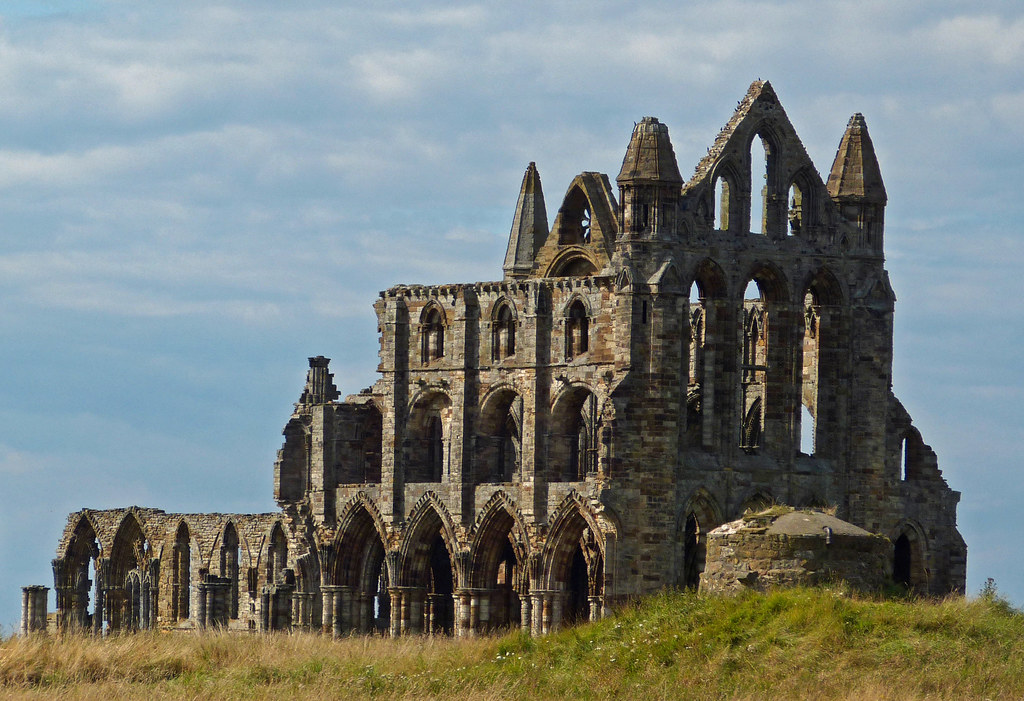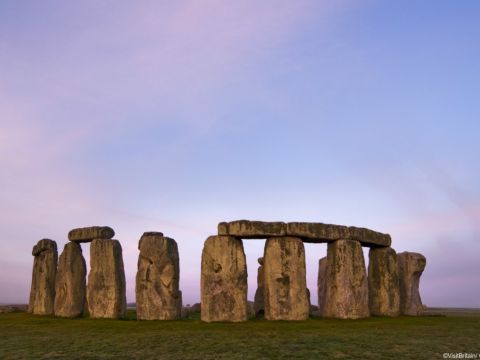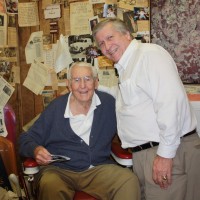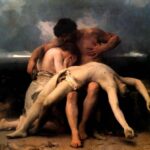Lafayette, CA. Peter Ackroyd is one of the most active and accomplished writers of the age. He has published more than sixty books, including award-winning novels, celebrated biographies, and histories adapted for television by the BBC. It was once his habit to work on three subjects at once: a historical theme, often his native London, in the morning; the life of some eminent poet, playwright, or martyr in the afternoon; and a piece of fiction, drafted longhand, in the evening. Now 72, he has completed a witty, informed, and insightful six-volume history of England. He made it look easy, finishing the project in just ten years, and putting out five other books along the way.
“My early life was influenced by religion,” Ackroyd confides. His Catholic upbringing gave him a sense of ritual, an interest in the supernatural, and “the sure knowledge that the world (and indeed the universe) has a spiritual as well as material existence.” This nose for the transcendent can be found in much of Ackroyd’s work, but it shines forth with particular power as he tells the tale of his homeland.
When he was young, Ackroyd wanted to be a Carthusian or a Trappist. He claims to have fulfilled his “monkish inclinations,” only that his work stands in for prayer. It is from history that Ackroyd receives his spiritual promptings. He has heeded the call, and his devotion has served him well. “If I had my time again,” he says, “I would not do or say anything differently.”
Like Ackroyd, Paul Kingsnorth is a magnificent writer and an Englishman (though he and his family now live in Ireland). Like Ackroyd, Kingsnorth knew at a young age that “there was something going on” in the world “that humans couldn’t grasp.” Unlike Ackroyd, however, he has led a restless spiritual life.
A poet, journalist, and novelist, Kingsnorth, 50, has been an environmental activist, a freelance eco-hack (as he words it), a notable figure in the anti-globalization movement, and the co-leader of a nature festival devoted to “uncivilization.” He says that all his books “tell the same story, however hard I try to tell another. It’s the story of the brokenness of modern humanity.”
Environmental catastrophe, Kingsnorth believes, is at this point inevitable. He is no longer interested in discussing how to solve climate change, since in his view it cannot be done. He’d rather talk about what he calls “the Machine” of global capitalism, about surviving the coming civilizational collapse with some dignity, and about the culture the survivors should try to build on the ashes. As he’ll happily tell you, he’s been labeled a doomer, a nihilist, an eco-fascist, a communist, a Luddite, a crazy collapsitarian, and (his current favorite) an “environmental activist turned apocalyptic mystic.”
“The storm is here and an age is ending,” Kingsnorth proclaims, and the goal of his current project, The Abbey of Misrule, a series of essays that he publishes on Substack, is to “work out what is going on and why.” Kingsnorth, again in parallel to Ackroyd, writes with erudition and eloquence about a broad array of topics. At The Abbey he touches on everything from Oswald Spengler to vaccine passports to Commodore Perry and the opening of Japan. Yet for Kingsnorth, as for Ackroyd, religion is the golden thread. “Our modern crisis is not economic, political, scientific or technological,” he reflects. “I believe that we are living through a deep spiritual crisis; perhaps even a spiritual war. My interest these days is what this means.”
From the start, England has been a land of religion. “The English of the early Neolithic age had some direct communion with the terrain,” Ackroyd reports. We know almost nothing of these people’s beliefs, or of the meaning of their stones and cursuses. They built “a ritual landscape of which the significance is now lost.” Stonehenge was in use for at least 1,200 years—the same stretch of time, Ackroyd notes, that separates us from the Venerable Bede. Why was it built and rebuilt? What were its purposes? The nature of its sacredness is not only lost; it may well lie “beyond the reach of the modern imagination.” What is clear is that “the ground was holy; the stones, and the earth, were sacred.”
The burial mounds of the Bronze Age are often near rivers, the ancient passages to the underworld. “Religious sanctuaries were established all over the land,” Ackroyd writes, “and it is safe to assume that even the smallest settlement had its own central shrine.” Evidence of shamanism reaches back to the Mesolithic, and, when he visited Britain in the fourth century B.C., Pytheas found a people still “deeply imbued in ritual worship.” This was the time of the Druids, practitioners of “divination, magic, and astrology” whose demise ended the “broad continuity of belief and worship throughout the prehistoric age.” They were destroyed by the Romans, whose strong gods gradually supplanted “the ancient deities of hill and forest.”
Kingsnorth has studied and practiced Zen Buddhism; he has explored “Daoism, mythology, Sufism, traditionalism, . . . and all sorts of other bits and pieces.” Traversing the same uncertain trackways as “so many lost Western people,” he has searched for truth, he says, in “all quarters.”
For a time he thought his destination was paganism. “I found God in nature,” he figured, “so I needed a nature religion.” He became a Wiccan. With his coven he conducted “rituals in the woods under the full moon.” He discovered that “magic is real”; that “it works.” He had found his home, “in the woods, worshipping a nature goddess under the stars.”
Some still call to the ancient deities of hill and forest. Whether those deities still respond is another matter. Is their significance now lost? “Wicca is a relatively new occult tradition, founded in the 1950s,” Kingsnorth explains. Although its “disparate parts” may be “strangely cohesive,” it ultimately stands on a quirky old man’s claim to have “discovered the ancient remnant of a pre-Christian goddess cult.” The man “was fibbing,” Kingsnorth dryly records.
“What I was doing in the woods,” Kingsnorth now sees, “though affecting, was at some level still play-acting.”
The Romans governed England for the better part of four centuries. Eventually, though, Jupiter and Venus were replaced by Woden and Thor, the protectors of warrior tribes that engaged in human sacrifice. The Anglo-Saxons built their new religious monuments on the ruins of the old. The Christians, present on the island from the second century, did the same. “The earliest churches,” says Ackroyd, “lie beneath more recent ones in the long history of sacred spaces.”
“England, as we understand it today,” Ackroyd remarks, “was created by the Christian Church.” Christianity was already widespread by the time Augustine arrived, at the end of the sixth century, but the eminent monk and saint (not to be confused with Augustine of Hippo) converted kings, founded the English Church, and became the first Archbishop of Canterbury. Religious unification invited political unification. “A single English Church seemed to require a single English nation as its stage.” Institutional Christianity stitched itself seamlessly into the land and the society. “The boundaries of the dioceses followed the frontiers of the old tribal kingdoms,” and until the coming of the Normans, “the archbishops, of York or of Canterbury, drew up the national law codes in consultation with the king.”
Religion was central to medieval culture, and, as Ackroyd relates with skill, the parish church was central to both. “Disputes were settled and negotiations undertaken, within the walls painted with images of the saints and the apostles.” The common people saw the liturgy as “a form of magical incantation,” and the eucharist was believed “to cure ailments or to ward off witches.” The mass was performed behind a rood screen, a “highly decorated wooden panel on which were painted or sculpted images of the Crucifixion or of the Day of Doom.” “Dogs and chickens wandered among the people, who stood or kneeled on the rushes or straw strewn over the earth floor.” The congregants gossiped, bickered, wagered, and sewed. “Thus proceeded the vigorous and ebullient religious life” of the Middle Ages, Ackroyd rejoices, “in which earth and heaven were inseparable.”
The Church had a fraught relationship with earthly power long before Henry VIII fell for Anne Boleyn. William Rufus protected the Jews of the realm in part simply to insult the bishops (“he enjoyed causing affront to his churchmen”). John left various bishoprics vacant so that he could collect their rents for himself. When they refused to pay his taxes, Edward I outlawed the clergy and seized their goods. And of course, Henry II had a series of disputes with Thomas Becket, culminating in Becket’s being hacked to pieces inside Canterbury Cathedral. The occasions for strife were so many because the Church itself was so powerful. It had its own laws and its own courts. It possessed vast estates. It remained a key actor in government, “with its principal servants becoming the chief administrators of the king.” By the fourteenth century, Ackroyd tells us, “the majority of the clergy had gone the way of the world.” Inspired by John Wycliffe, the Lollards responded to this corruption and complacency by denying the existence of purgatory, the value of confession, and the possibility of transubstantiation. Even so, “the religion of the vast majority of the English people remained utterly orthodox and familiar.”
The faith into which Henry VIII was born lives on in a book of hours reputed to have been owned by the king himself. The book contains a calendar organized around the saints and their feasts. It divides the day into a series of psalms and prayers. Its folklore is astonishing and violent. Tales in Henry’s book include Job on the dung heap, the martyrdom of Adrian, Saint Sebastian shot with arrows, the massacre of the innocents and flight into Egypt, Saint Michael battling a devil, the decapitation of Barbara, and the feast of dives (in which a rich man, having failed to share the crumbs of his table with the poor, is tortured in hell).
Early in Henry’s reign, Martin Luther composed his tract attacking the Vatican’s hold on the sacraments. Henry published a reply. The pope declared the king “Defender of the Faith,” the “faith” of course being the Catholic one, though the British monarchy has brandished the title ever since. Henry’s later quarrel with Rome was not about doctrine; it was about his authority as a king, his need for a male heir, and his libido. After the Church refused to grant him a divorce from Catherine of Aragon, he declared himself Supreme Head of the Church of England, executed Thomas More, and pillaged the monasteries. The schoolchildren’s ditty about his wives goes: “Divorced, beheaded, died; divorced, beheaded, survived.” All the same, Ackroyd submits, and despite his excommunication by Pope Paul III, Henry likely “died, as he had lived, a Catholic.”
Henry was followed by his son, Edward VI, a staunch Protestant, then by his daughter Mary, a staunch Catholic, then by his daughter Elizabeth, whose views rested somewhere in-between. Good Queen Bess had to chart a course between the Catholics, with their incense and their ceremony, on the one side, and the Puritans, with their sparse rooms and severe habits, on the other. The upshot was the Elizabethan settlement, “a ‘midge-madge’ of contradictory elements,” Ackroyd states, that “was soon to pass under the name of Anglicanism.” The “English liturgy contained elements old and new, and the perils of religious speculation were avoided with a studied vagueness or ambiguity.” The arrangement Elizabeth left the nation was sufficiently sturdy, however, to survive Charles I’s fondness for crypto-Catholic Laudianism in the early seventeenth century; the mid-century triumph of fanatical Puritanism and Presbyterianism (though Cromwell was a notable proponent of toleration); and the Jacobite plots, scares, riots, and revolts that lasted well into the 1700s.
In 2019 Kingsnorth published Savage Gods, a work thick with desperation. “I am a lost person,” he exclaims at the outset. He was a seeker who had discovered that there is nothing to find. “There is nothing to belong to because there is no culture for us anymore, only civilization, and they are not the same thing.” He was a writer who had lost faith in the power of the pen. “I feel that words are savage gods and that in the end, however well you serve them, they will eat you alive.”
Kingsnorth had never wanted to become a Christian. Those tales about miracles and resurrections are illogical and silly, he understood. And what of all the wrongs done in Christ’s name? The “aggressive Christian evangelism” visited upon native tribes, for instance? But “Savage Gods turned out,” as Kingsnorth now puts it, to be “a prelude to a spiritual drowning.” “Under the water I went, down to the bottom.” And then, flailing in the deep, he started to see signs. Jesus appeared to him in a dream. Christians, total strangers, started to email him. Friends began without prompting to tell him of their faith. It was relentless. He felt hunted. At the time, he wanted it to stop. “A Christian? Me?” he asked himself. “What could be weirder?”
But the signs continued, until one day, as he walked into a children’s music recital, he was abruptly hoisted from the abyss, raised a thousand leagues, and jolted across the surface, with great splash and spray, to behold with blinking unadjusted eyes the light of day. In an account of his conversion published by First Things, he writes:
Suddenly, I could see how everyone in the room was connected to everyone else, and I could see what was going on inside them and inside myself. I was overcome with a huge and inexplicable love, a great wave of empathy, for everyone and everything. It kept coming and coming until I had to stagger out of the room and sit down in the corridor outside. Everything was unchanged, and everything was new, and I knew what had happened and who had done it, and I knew that it was too late. I had just become a Christian.
A few years before, Kingsnorth had visited a church in Bucharest, and been impressed by its atmosphere and its relics, its age and its depth. Little had he known that, in early 2021, he would be baptized into the Romanian Orthodox Church. In the span of a few months, he went from being “an eclectic eco-pagan with a long-held, unformed ache in my heart” to “a practicing Christian, the ache gone and replaced by the thing that, all along, I turned out to have been looking for.”
In Kingsnorth’s eyes, earth and heaven are inseparable. At The Abbey of Misrule he praises Saint Patrick, quoting a description of him as “a holy man, indeed a visionary for whom there was no longer any rigid separation between this world and the next.” There is nothing in this world, Kingsnorth proposes, “which is not in the broadest sense ‘religious.’” We are surrounded by the transcendent mystery. The “sense of ‘sacredness’” in the liturgy, Kingsnorth holds, is “the stuff of life itself.”
The ground is holy; the stones, and the earth, are sacred. In the island of his birth (as well as the island he now calls home) Kingsnorth is certain that a wild Christianity still “lives in the land.” It is in the ruined chapels and sacred wells. It is in the caves and the mountains. At the “ancient Christian sites across Britain,” Kingsnorth vows, you can sense “that everything is holy. That the world itself is a book in which the nature of divinity can be read: that the sea and the rock and the sun’s last setting are a daily revelation.”
The story of English religion in the last three-hundred years is mainly a tale of decline, although spots of brightness and vigor can be found. John Wesley and George Whitefield led the eighteenth-century “awakening” now known as Methodism. Ackroyd describes them as celebrants of “the change which God works in the heart through faith in Christ.” They preached outdoors—“whole communities who had never before been known to attend a church, gathered in the hills and open spaces.” Wesley preached eight-hundred sermons a year (“such is the effect of burning conviction”). Whitefield “cried aloud; he stamped on the wooden platform; he wept. ‘Oh my hearers, the wrath is to come! The wrath is to come!’” “In previous centuries,” Ackroyd suggests, the Anglican Church “would have turned” on the new evangelists “with all the guile and fury at its command.” “But the Church was now not so strong,” he continues; “many of its members were easy or indifferent; they attended worship every Sunday as a social duty, but nothing more.”
By the nineteenth century, Ackroyd observes, there was a “Low Church of Evangelicals and Dissenters”; a “High Church that moved toward Catholic ritual”; and “Calvinists, Methodists, Quakers, Armenians, Presbyterians, Congregationalists and Baptists,” most of them passionate believers in providence, progress, and moral reform. “What really interested observers,” however, “was the fact that many of the ‘respectable’ classes had no faith at all.” They were “armoured with scepticism against the arguments of priests and preachers.” In the second half of the century, even churchmen were writing works of biblical criticism. “The certainties of the past” were “being eroded by what were seen to be ‘objective’ and ‘scientific’ solutions.”
The traditions of village life faded away. A suburban class began spending its Sundays “playing golf, tennis and bowls rather than going to church.” “Their indifference to the established Church of England set the tone,” writes Ackroyd, “for the entire nation, and for the coming [twentieth] century.” “Some clergymen were concerned that the workers” of the post-Victorian era were “regressing to paganism, while more acute observers believed they had never fully converted to Christianity in the first place.” The horrors of World War I further disrupted whatever remained of comfortable piety. “What kind of God,” Ackroyd asks with a sniff, “would sit by and watch such carnage?”
As Kingsnorth says, “the English, ever since the Reformation and its traumatic aftermath, haven’t really done religion.” In modern times, strong devotion has been a specialty of the fringe.
The utopians, socialists, and assorted freethinkers of the mid-nineteenth century were riveted by the occult—by “spiritualism,” as Ackroyd elaborates, “with its panoply of levitations, ghosts, spirits, table tappings, automatic writing, telepathy and shadow photographs.” The source of this fascination cannot be proven, but Ackroyd suspects a reaction to “such Victorian shibboleths as free trade, profit and loss, and factory hours.” Ackroyd quotes Lord Palmerston’s dictum that “Commerce is the best pioneer of civilization.” The mores of the merchant were carrying all before them, to the confusion of old values, old ways, and old certainties.
The industrious Victorians may be gone, but the merchant outlook has triumphed. At its heart, Kingsnorth complains, is a thirst for “progress, profit, money,” for “boundless economic growth via boundless sensory stimulation.” He notes, with something near despair, that modern Western societies have placed the merchant at the top of the social pyramid. We are merchant peoples. Even our gurus are merchants. Their spiritualism is packaged into seminars, wedged into self-help books, crammed into tweets, and set adrift into the so-called attention economy at a tidy profit. (“In a Machine age,” Kingsnorth protests, “the feted artists are the ones prepared to act and talk and create like good little well-behaved Machine people.”)
Ackroyd and Kingsnorth want nothing to do with the speaking circuit, the publicity hustle, the cable news ruckus, or the mayhem of social media. Ackroyd seems content to sit by himself, ferreting out what he calls “the invisible agencies and the unseen powers.” He is not suffering the effects of burning conviction. An interviewer once asked him what he does besides writing. “I drink,” he answered. “And that’s about it.”
“I don’t offer ‘solutions’,” Kingsnorth announces, “because I don’t have any. I only have my instincts, and a battered keyboard.” Our culture was built around the Christian story, he intones, but the story has receded and the culture is dead. He does not pretend to restore that story to its seat, or to offer another in its place. “This is long, hard work,” he warns. It is “intergenerational work. It is myth work. We don’t really want to begin, and we don’t really know how to.”
Where do we go from here? Ackroyd and Kingsnorth have each made something of a separate peace. For Ackroyd, it seems, history is religion. Time itself is sanctified. A pretty vision—but is it real? “Is it England that lives deep in the past?” asks one critic. “Or just Ackroyd?” Kingsnorth’s faith, though less peculiar, is equally personal. Not everyone is hunted by the lamb of God. And it is not as though Kingsnorth reclaimed the faith of his fathers. You might even say that an Englishman who joins the Romanian Orthodox Church is engaging in an act of contemporary self-expression.
Still, Kingsnorth sells himself short. He does know how to begin. We live, he notices, in a society where lust, greed, gluttony, sloth, wrath, envy, and pride have been commercialized. When the self and its desires are everywhere celebrated, to contain the self is a form of revolt. There begins the path. There begins the search for the eternal things. The first step is to rediscover renunciation. “What does it mean?” Kingsnorth asks, “and how do you do it?” These questions are not glitzy; they are not click-bait. Kingsnorth is not seeking to go viral on TikTok. He is chasing after a truth that has become a secret.
The din of the marketplace. Barter and bustle; trinkets and swindles; tawdry spectacle. You seek—what? Display? Repletion? A poet stands to the side. He is dusty and has no wares, but he is staring at you. You try to ignore him. Look here—milk and honey! Over there, lamps, carpets, potions! Price reduced! Save a few shekels for the jugglers. . . . But the poet is still staring at you. . . . At length you meet his gaze. He beckons you. You step to him. He whispers in your ear.
The earth is alive. And you will return to it.
“Primitivism is dangerous for me,” Kingsnorth concedes in Savage Gods. It is all too easy to project one’s hopes and desires onto an imagined past. Surely he still knows of this risk. It is conceivable, to put it no higher, that the eternal things have always been ignored, obscured, faked, and burlesqued, and that people have always simply pressed on, in an often harsh and alienating world, as best they can. Kingsnorth urges “love, wisdom, discipline and stillness amid the roaring of the Machine.” You need not be a Christian—or even to feel particular angst about the Machine—to cultivate these qualities. The love that enables forgiveness and the wisdom that produces understanding. The discipline to bear burdens for others and the stillness to stand, if only for a moment, before God.
Today an old English chapel is often a nightclub, and the great Anglican cathedrals can serve as putt-putt courses. Perhaps this is the terminus of the island’s long spiritual journey. More likely, it is simply the latest turn in the cosmic cycle. England retains the outward marks of the divine truths. In Canterbury Cathedral there stands the tomb of Edward the Black Prince. “Such as thou art, sometime was I,” the epitaph reads. “Such as I am, such shalt thou be.” Ackroyd hopes that “as the millennium progresses, the English will recover what was once their glory”—a “capacity for awe.” With that wish he closes his chronicle. The land is waiting to be re-enchanted.
Image Credit: Whitby Abbey, one of the monasteries ruined by Henry VIII.









5 comments
John Crooks
Wow. Fantastic piece. Thank you Corbin.
David Naas
Once upon a time, many decades ago, a colleague at work was talking about some new book by a popular religious figure he had purchased. I quoted the lines of a then-popular musical to him.
“Roll on up, for my price is down
Come on in for the best in town
Take your pick of the finest wine
Lay your bets on this bird of mine
Roll on up, for my price is down
Come on in for the best in town
Take your pick of the finest wine
Lay your bets on this bird of mine
Name your price; I got everything
Come and buy, it’s all going fast
Borrow cash on the finest terms
Hurry now while stocks still last”
He sat there for a moment, with a strange look on his face, and finally blurted out, “My God, I never thought of that. But that’s what it is.” The Gods of the Marketplace will sneak easily and gladly into the Church, any Church.
On the other side is the importunity of the Crowd.
“See my eyes, I can hardly see
See me stand, I can hardly walk
I believe you can make me whole
See my tongue, I can hardly talk
See my skin, I’m a mass of blood
See my legs, I can hardly stand
I believe you can make me well
See my purse, I’m a poor poor man
Will you touch, will you mend me, Christ?
Won’t you touch, will you heal me, Christ?
Will you kiss, you can cure me, Christ?
Won’t you kiss, won’t you pay me, Christ?”
And if the Crowd doesn’t get what they want, they can snap in a split instant to crying, “Crucify Him! Give us Barabbas.” (Ironically, ‘Barabbas’ means ‘Son of the Father’. Pays your money, takes your chances, at least without any sort of anchor.)
Grant
Corbin,
Thank you for the great article.
Your closing line brought to mind the current endeavor of British poet-priest Malcolm Guite. He has felt the call to “take up the tale”, and retell and expand on the Arthurian legend for the current age, which he is doing in ballad form. He expressly notes how the tale still reverberates in the hills, rivers, rocks, and trees of England.
https://www.youtube.com/watch?v=lzlChV9dG8o
Beyond that, the men and women of England would do well to return to and heed the gospel preached by Whitefield and his spiritual heirs.
Adam Smith
Enjoyed this piece very much – a nice pairing of writers.
Martin
A marvelous overview, Corbin. Thank you.
This sentence, apparently paraphrasing Ackroyd about the disappearance of Celtic gods, got me thinking:
*They were destroyed by the Romans, whose strong gods gradually supplanted “the ancient deities of hill and forest.”*
I don’t think it was the “strength” of those gods that destroyed the Druids and nature religion in general (which is still viable as Shinto in Japan). Rather, I think it was the universality of the Roman gods, imposed by imperial power, but echoing the revelation of Jeremiah: God can be worshipped anywhere, not only in a holy land.
In that light, the verse in Psalm 137 that was popularized in the Reggae song “Rivers of Babylon” might be seen as a plea for direction, rather than a cry of hopelessness: HOW shall we sing the Lord’s song in a foreign land?”
The globalization of Christianity, and later Islam, is founded on this recognition of universality.
Comments are closed.